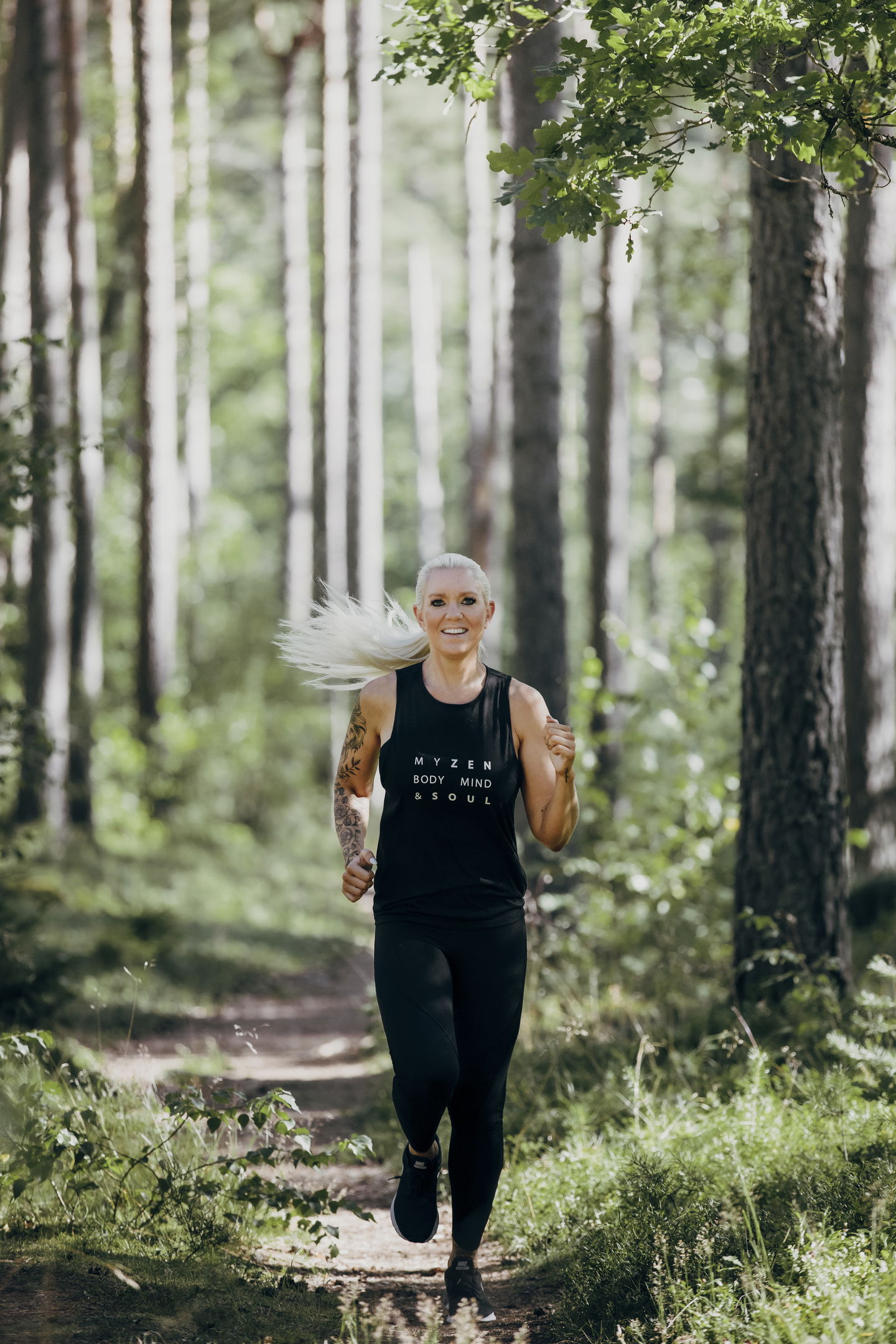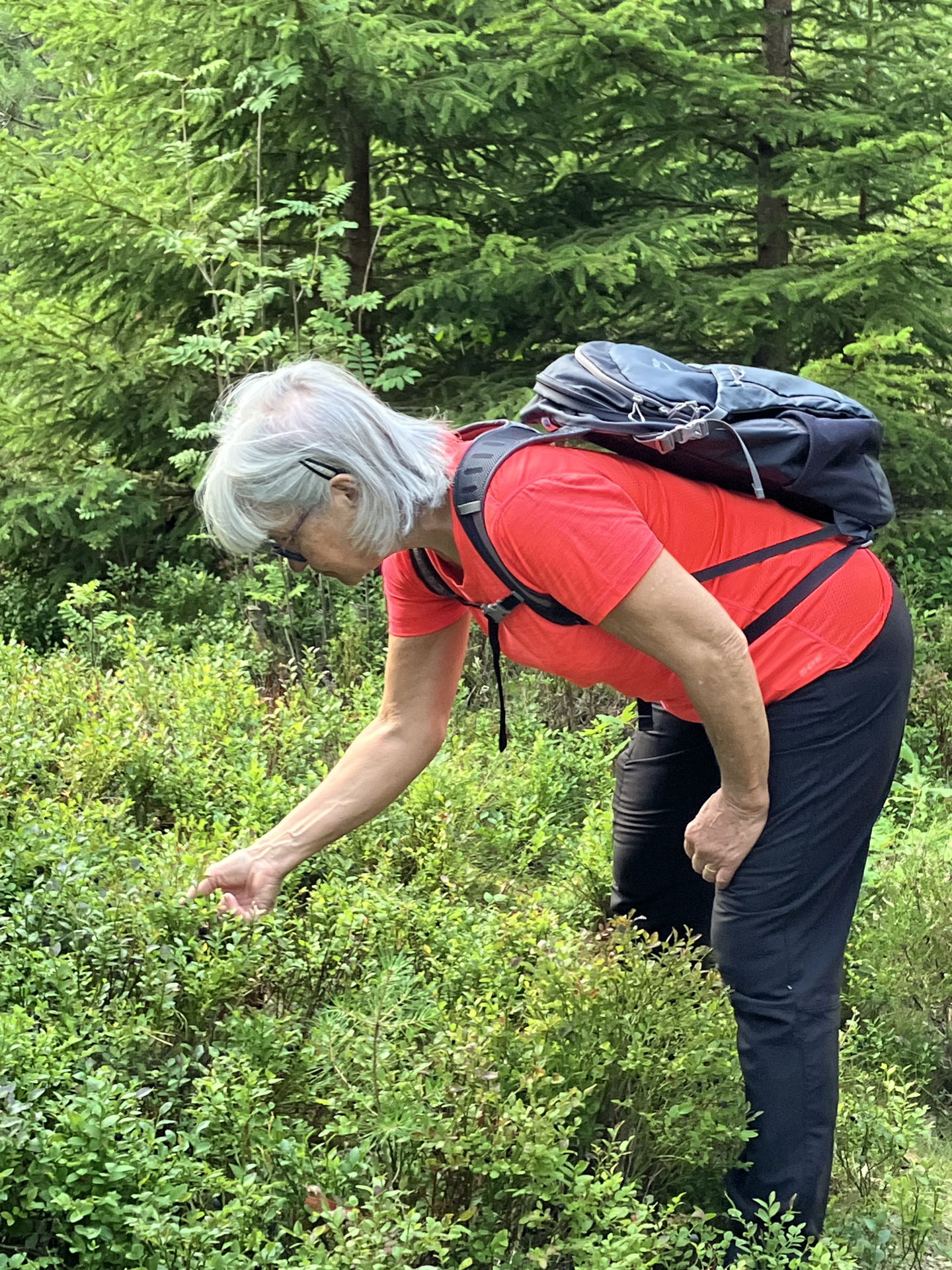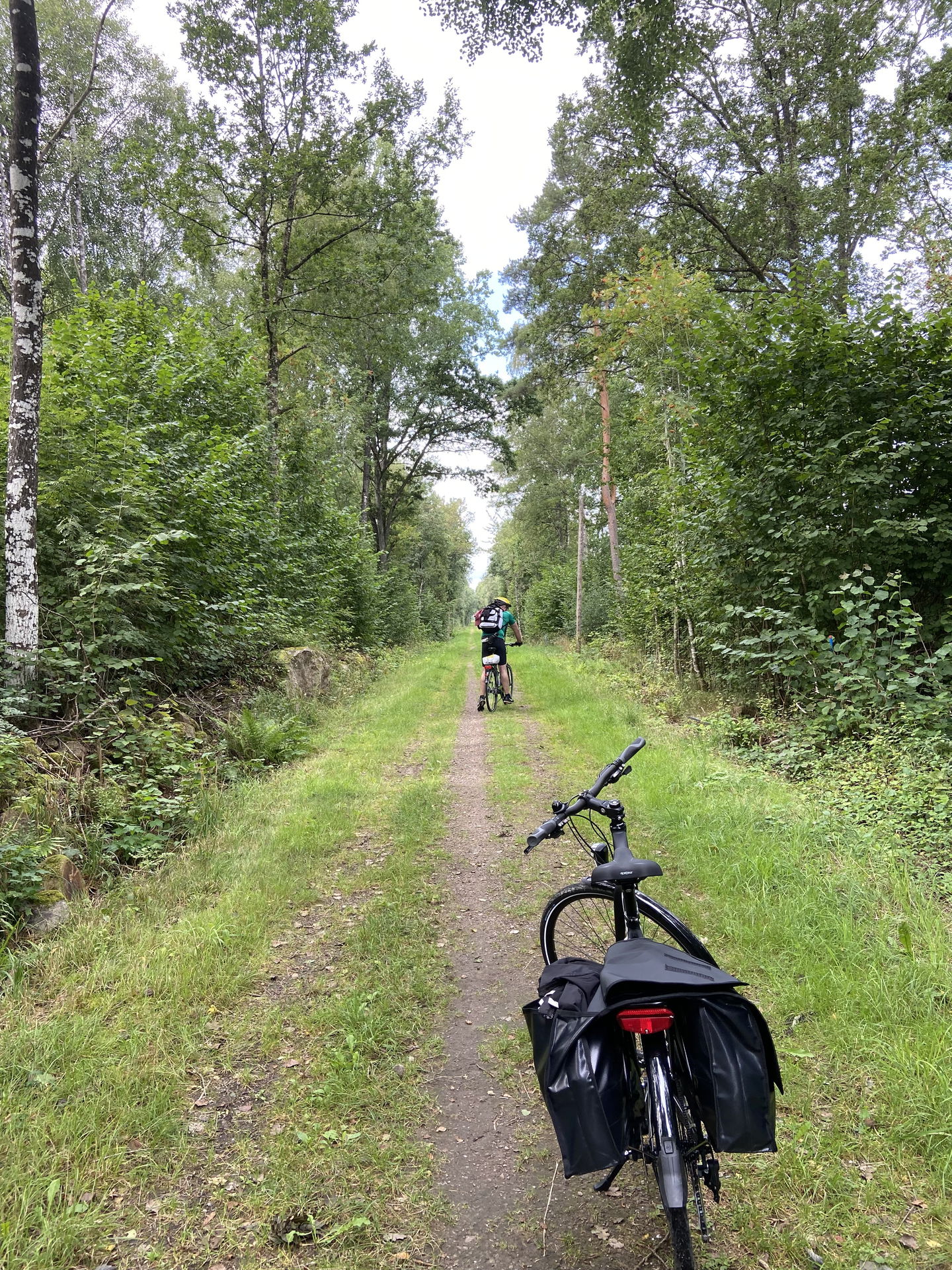The right of public access
Images
Picking berries, running on trails, and pitching a tent by a mirror-like lake. All this and much more is possible thanks to the right of public access. The right of public access is a unique opportunity that allows us all to move freely in nature. It is based on us taking responsibility together. We exercise the right of public access when we show consideration for animals, nature, landowners, and fellow humans. Here are some tips for you. Take them to heart, stand tall, and feel that it is easy to do the right thing!
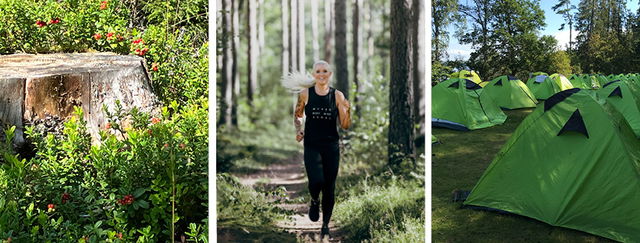
7 Ways to Do the Right Thing
TIPS IN NATURE
- Pack a bag. Collect trash from lunch and take it home.
- Pack a small shovel. Then you are ready to bury your waste.
- Want to see reindeer or other animals? Bring binoculars and watch from a distance.
- Reduce packaging. Skip plastic clips and cans, switch from plastic bags to beeswax wraps or lunch boxes, from tampons to menstrual cups, and from wet wipes to soap and a towel.
- Planning a campfire? Bring firewood.
- Is the ground dry? Bring food that does not require a fire.
- Visiting a national park or nature reserve? Check the rules beforehand.
Roam freely almost everywhere
Put on sneakers or hiking boots and walk over mountains, on trails, and gravel roads. You exercise the right of public access when you pass houses from a distance so that the residents can have peace and quiet. You also take a detour around fields and newly planted forests, keep a distance from grazing animals, and close the gate behind you in the pasture.
DID YOU KNOW:
- In newly planted forests, it can be difficult to see the small tree seedlings.
- In winter, you need to choose a different path for your walk than prepared ski tracks.
Cycle on durable surfaces
Pedal out and enjoy winding trails and steep climbs. You exercise the right of public access when you adjust your riding style to the terrain, avoid ground that is too wet or sensitive, and slow down when you meet someone. Choose detours around forest plantations and fields and give way to pedestrians.
DID YOU KNOW:
- Sensitive ground means ground where bicycle wheels leave large tracks.
- Bogs and ground with moss and lichens are particularly fragile.
- Cycling with e-bikes in nature is not included in the right of public access.
Ride on firm ground
The nature experience from horseback is unbeatable. You exercise the right of public access when you ride on trails and roads with firm ground and take detours around fields, meadows, pastures, and forest plantations. When you ride on a road, it is polite to dismount and remove the horse's waste.
DID YOU KNOW:
- The horse's steel-shod hooves increase the risk of damage to the ground and tree roots.
- When trails and roads become wet, they are particularly sensitive to horse hooves.
- Bogs and ground with moss and lichens are particularly fragile.
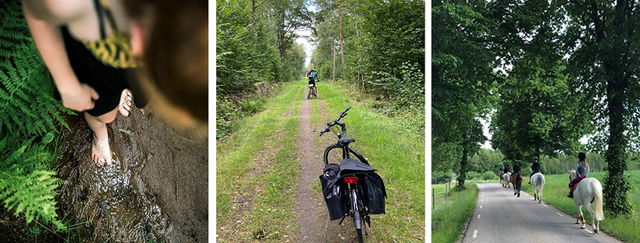
Stay for a few days
Thanks to the right of public access, you can sleep under a starry sky and wake up to a sunrise. You exercise the right of public access when you pitch your tent on durable ground, which is also far from residential houses. Residents should not even be able to see you from their window. The more secluded, the better.
DID YOU KNOW:
- There is no law on how long you can camp in the same place, the rule of thumb is a few days.
- Pastures are nice, but there are much more suitable places to camp.
- Very soft or wet areas with sensitive plants, moss, and lichens are not suitable as campsites.
Overnight Stays with Motorhomes or Roof Tents
The right of public access does not apply to overnight stays with motorhomes or roof tents. The right of public access covers camping when hiking and biking. For motorhomes and roof tents, different rules apply, and you often need permission or use designated areas such as campsites.
Take your trash with you
Leave nothing but footprints in nature. You exercise the right of public access when you have a bag with you to collect trash and food scraps to take home or throw in a trash can. One way to help nature is also to pick up other people's trash along the way.
DID YOU KNOW:
- Plastic breaks down very slowly or not at all in nature. This also applies to bioplastics.
- Snus portions and cigarette butts contain plastic and should therefore be taken home.
- You can pack smart and reduce packaging before you go out.
Follow the law of necessity
You can relieve yourself in nature, but necessity has a law. You exercise the right of public access when you choose a place far from watercourses and where people walk. Dig a hole first. Then cover it well with soil or a large stone. Bury, burn, or take the toilet paper home.
DID YOU KNOW:
- A garden trowel makes it easier and should be included in the packing.
- Dog poop bags take up little space, collect your toilet paper there and take it home.
- Wet wipes often contain plastic, take them home.
Keep a Distance from Residential Houses
You are allowed to move freely almost everywhere. But within the privacy zone, that is, the area closest to a residence, you may only be if the homeowner thinks it's okay. You exercise the right of public access when you pass a residential house at a proper distance and respect that the resident wants to be left alone.
DID YOU KNOW:
- There is no law on how large the privacy zone is. The distance to residential houses, a fence, or how the terrain and vegetation look determines it.
- If you want to stop and eat a snack or camp, you need to keep a longer distance from houses than if you are just passing by quickly.
Show Consideration on the Water
Enjoy the right of public access on wavy seas and still lakes. Dock with your kayak, swim at a beach, and use a pier for a while. You exercise the right of public access when the beach, cliff, or pier is far from someone's house. And of course, you leave the pier if the owner wants to use it.
DID YOU KNOW:
- Within the privacy zone, that is, the area closest to someone's residence, you may only be if you ask the resident for permission.
- Some bird, seal, and other animal protection areas may only be visited at certain times of the year.
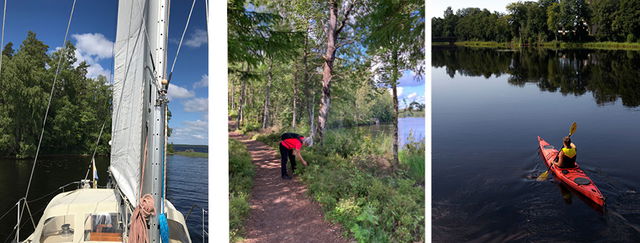
Enjoy What Nature Provides
Here you go – the right of public access makes it possible to enjoy what nature provides. You exercise the right of public access when you take branches, cones, and nuts that are already on the ground and pick wildflowers, berries, and mushrooms that are not protected.
DID YOU KNOW:
- You can pick as many berries and mushrooms as you want.
- Which flowers and plants are protected varies in different parts of the country.
- If you break living branches from growing trees and bushes, it creates wounds that make them grow worse or die.
Read Up – Special Rules May Apply Here
The right of public access also applies in nature reserves and national parks. But it can be limited. You exercise the right of public access when you check what applies in the area you are going to visit. In some areas, you are not allowed to make a fire or bring your dog. Cycling and riding may be allowed, but sometimes only on marked trails. In some areas, you are not allowed to camp, or only do so in designated places.
Make Fires Safely
The crackling of a campfire is enchanting. You exercise the right of public access when you use a fixed grill place or choose gravel or sand as a base. A camping stove is also good. Keep an eye on the fire and extinguish it completely before leaving for new adventures. Scrape a little in the ashes to make sure there are no embers left.
DID YOU KNOW:
- Cliffs and large stones can crack if you make a fire directly on them, so avoid that.
- In moss, peatland, or earthy forest land, the fire can easily spread and smolder.
- Nature reserves and national parks sometimes have special rules for making fires.
- Fire bans are common in spring and summer. Check with the municipality or county administrative board and bring food that does not require a fire if the ground is dry.
Keep an Eye on Your Dog
You and your dog feel good being in nature. An easy way to exercise the right of public access is to keep the dog on a leash so that wild animals and people afraid of dogs can have peace and quiet. Feel free to take a detour around pastures with grazing animals and always keep the dog on a leash in the mountains where there are reindeer.
DID YOU KNOW:
- From March 1 to August 20, wild animals have young, then your dog is not allowed to run loose in nature.
- Hunting dogs are allowed to run loose during the hunting season and hunting training.
Keep a Distance from Grazing Animals
Mooing cows on green pastures are a peaceful sight. Can't find a way around the pasture on your walk? Then it may be okay to go through it. You exercise the right of public access when you close the gate behind you, stay calm, and keep as much distance as possible from the animals.
DID YOU KNOW:
- Some animals, like cows with calves, can react aggressively to people if they are disturbed.
- If you want to pet the animals, you need to ask the landowner for permission.
- Passing through a pasture is at your own risk.
Use Private and Public Roads with Consideration
Through private or public roads, you can reach swimming lakes, berry fields, and hidden spots. Often the road is owned by a private person, and here you are allowed to walk, cycle, and ride. Respect barriers and signs, even handmade ones, on private roads if you are travelling with a vehicle such as car or motorhomes. You exercise the right of public access when you pass houses from a distance and leave the residents in peace.
DID YOU KNOW:
- It is okay to pass on a village road that goes through a farm and continues on the other side of the farm.
- Barns and outbuildings that are close to the road can usually be passed without problems.
When Does the Right of Public Access Not Apply?
The right of public access is a unique opportunity that allows us to move freely in nature. But in some cases, the right of public access does not apply, for example, for motor vehicles, then other rules apply. Hunting and fishing are also not included, and in nature reserves and national parks, other rules may apply.
KEEP IN MIND:
- Municipal regulations can limit the right of public access and, for example, mean that you are not allowed to camp or make a fire in an area.
- When you go fishing, you often need a fishing permit or other permission, check with the county administrative board what applies.
THE RIGHT OF PUBLIC ACCESS IS NOT A LAW, BUT
With freedom comes responsibility. The right of public access is not a law, but it is enshrined in Sweden's constitution. Around the right of public access, there are laws that set limits on what you can and cannot do in nature.
ACCORDING TO THE LAW, YOU MAY NOT:
- Drive motor vehicles on bare ground.
- Litter or break branches, take birch bark, and make fires on cliffs.
- Let the dog run loose when wild animals have young.
- Disturb or scare reindeer.
- Be within the privacy zone without permission.
- Walk over plots, plantations, and fields with growing crops.
- Intentionally hinder, complicate, and disturb hunting or fishing.
The information is sourced from the Swedish Environmental Protection Agency (Naturvårdsverket). The translation is AI-generated.
Links
Contact
Email address
Organization logotype





